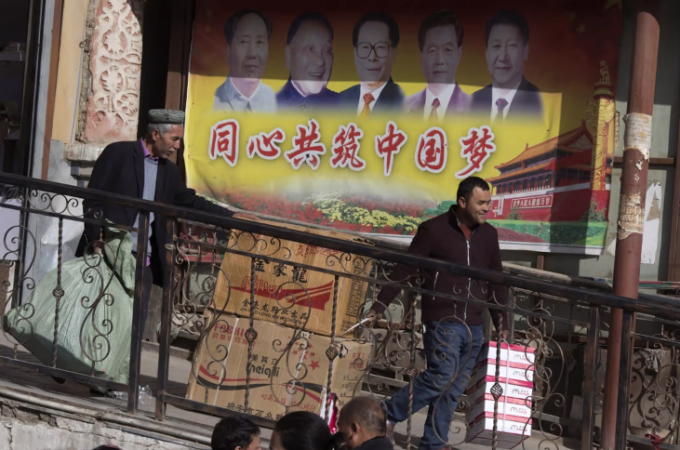
EU: While some said the draft EU ban on forced labor fell far short of their expectations, European lawmakers generally praised it.
The new proposal, about which The Post wrote last Saturday, would forbid all goods produced through forced labor to be sold in the single market.
According to EU Trade Commissioner Valdis Dombrowski, "We are proposing a new system to eliminate products made by forced labor from the EU market, regardless of where the product is made."
However, lawmakers saw it as a response to their calls to outlaw products made from forced labor, particularly those produced in far-western China's Xinjiang region, where Beijing has been accused of running a widespread system of forced labor. Is.
The head of the Parliament's Trade Committee, Bernd Lang, said, "The European Parliament has put forth its demands and the Commission is distributing as many cases as we wish." "We can build on this strong foundation."
According to a statement by Lang's Socialists and Democrats group, "The recent UN report condemning human rights abuses against the Uighur minorities in China's Xinjiang region confirmed the urgency of the action."
Compared to the US model effectively banning imports of goods made in Xinjiang, the proposal is very different.
Unlike Washington, Brussels was concerned about breaking WTO rules and specifically targeting Beijing.
The EU instead suggested a risk-based model that flagged products from sectors or industries considered to be involved in such practices.
Products suspected of containing any ingredient from Xinjiang will inevitably raise red flags, according to an EU official who spoke on condition of anonymity.
Once multiple levels of inspections convince authorities that it is contaminated with forced labour, and to confiscate and destroy these products at the border, pan-European customs officials will be banned from sale throughout the European Union. .
According to Christoph Hansen, international trade spokesman for the European People's Party, the largest group in parliament, the proposal shows that "we no longer tolerate inhuman treatment."
"No more slave labor, no products created by forced labor from so-called re-education camps," Hansen declared. And while there may be an initial cost to consumers, protecting our values is a cost.
I particularly welcome the fact that this tool is WTO-friendly,” said forced labor negotiator Samira Rafaela of Centrist Renew Group, who said on Wednesday that she was “shocked by the unspeakable behavior of Uighurs in China”. was.
Beijing has consistently denied allegations of human rights abuses in the region, with its foreign ministry saying "there has never been forced labor in Xinjiang".
The Chinese mission in the European Union did not respond to a request for comment.
Under the proposal, the 27 EU member states would be required to establish and fund "competent authorities" to apprehend goods suspected of using forced labour.
These products may be differentiated as a result of searches carried out by external parties, such as non-governmental organizations or other companies within or outside Europe, or on public databases of the Central European Union that provide users with goods and areas that forcibly labor can be used.
Lang and others expressed concern that the need for monitoring and supporting the ban by 27 different authorities at the national level could make it vulnerable to piracy.
We have to go deeper into the fraud case, Lang said. "We will undoubtedly need to consider the resolution's emphasis on the role of EU member states. The idea that the European level should ultimately not play a major role has not completely conquered me.
Raphael Glucksmann, a proponent of a complete import ban and one of parliament's loudest voices on China, praised the draft as "an important milestone and the result of years of civil mobilization and political fighting".
The French socialist MEP recalled that "two years ago, we were told that such a device was impossible." Now we must make sure that the intended system works as quickly and effectively as possible.
It is now up to Parliament and the European Council, which will each negotiate their own draft legislation based on the resolution and be appointed by diplomats and government representatives from member states.
The parties will then meet to discuss a composite ban with the commission. It will take two years to build the necessary systems after the negotiations, which some expect to be tense. As a result, it will be at least three years before the ban goes into effect.
According to Noah Barkin, an EU-China analyst at Rhodium Group, "in an ideal world, if member states take the forced labour issue seriously, then this could be an important tool." "But that depends a lot if"
Even in the best-case scenario, Barkin continued, "enforcement of the ban won't start for another three to four years." "No one in Beijing will tremble in their boots over this proposal,"
Greens in the parliament stated that the draught fell far short of their expectations, implying that the commission faced a difficult battle.
Unlike in the US, products are not seized if forced labour is suspected; instead, a thorough investigation is conducted first, according to Green Party member Anna Cavazzini, who is a strong supporter of a total import ban.
Cavazzini expressed concern about the lack of compensation for victims of forced labour and the fact that, unlike in the US, national authorities bore the burden of proof rather than importers.
"It's time to start working now. In the negotiations, I will make every effort to strengthen the proposal so that we can effectively remove products made with forced labour from supermarket shelves.
The leader of the parliamentary delegation to China and Green Party member Reinhard Buetikofer also expressed disappointment. We didn't want this, he declared. The Uygur Forced Labor Prevention Act set an example for other legislation, which the proposal "falls short of."
EU will propose a ban on products made using forced labour
UN experts argue that China's behaviour in Xinjiang justifies a special human rights session
UN: China may have committed crimes against humanity in Xinjiang